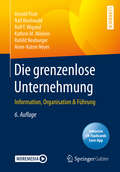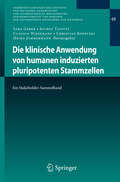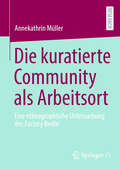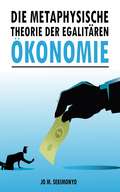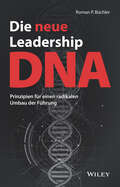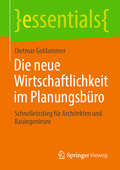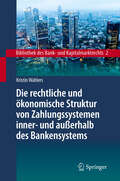- Table View
- List View
Die globale Armut bekämpfen: Wirtschaftspolitische Strategien für Entwicklungsländer
by Basil OberholzerDieses Buch zeigt auf, welche Pfade Entwicklungsländer verfolgen können, um ihren Handlungsspielraum zurückzugewinnen und die Lebensbedingungen der Menschen langfristig zu verbessern. Gemäss der dominanten Wirtschaftslehre sind Märkte die zentralen Motoren für Wachstum und Armutsreduktion in Entwicklungsländern. Die bisherige Erfolgsbilanz ist allerdings enttäuschend. Andererseits haben arme Länder, die den Dynamiken des globalen Kapitalismus ausgesetzt sind, kaum eine Chance, alternative Entwicklungsstrategien umzusetzen. Politische Massnahmen für eine gerechtere Einkommensverteilung oder für mehr öffentliche Investitionen laufen Gefahr, von Finanzmärkten und Kapitalflucht abgestraft zu werden. Das Buch betrachtet zentrale ökonomische Grundlagen und entwirft mögliche Entwicklungsstrategien.
Die grenzenlose Unternehmung: Information, Organisation & Führung
by Anne-Katrin Neyer Arnold Picot Rahild Neuburger Ralf Reichwald Kathrin M. Möslein Rolf T. Wigand" ... Hier wird ein theoriegeleitetes und dennoch spannendes Lehrbuch vorgelegt, das das Veränderungspotential der Informations- und Kommunikationstechnik für die Struktur und für das Management der Unternehmen umfassend darlegt. In hohem Maße auch für Praktiker lesenswert..." Frankfurter Allgemeine Zeitung Die 5. Aufl. wurde aktualisiert. Insbesondere wurden die zahlreichen Praxisbeispiele in allen Kapiteln überarbeitet.
Die große Führungskrise
by Hans Joachim Hoppe Bernd OkunWie Führungskräfte in einer Welt, in der die Gesetze von Beschleunigung, Komplexität und Entstrukturierung gelten, erfolgreich agieren können, zeigt dieses spannende Buch in der 2., aktualisierten und erweiterten Auflage. Die Welt hat sich radikal gewandelt – mit ihr unsere Unternehmen und unsere Führungskultur. Die heutige innovationsgetriebene Wirtschaft beschert uns einen rasanten Komplexitätszuwachs und lässt sich mit dem bisherigen „Betriebssystem“ von Führung nicht mehr steuern. Versagt Führung, gehen die Leistungsträger. Daher gilt es in der Führung umzuschalten auf ein neues Programm von Fähigkeiten. Das "Manifest neuer Führung" gibt wertvolle Anregungen für die Führungspraxis. Die Lektüre ist ein Investment mit hoher Führungsrendite.
Die große Geldentwertung: Wie Sie sich darauf vorbereiten und sogar davon profitieren können
by Adam BarattaWas in normalen Zeiten verrückt erscheint, erscheint in einer Krise notwendig! Im Jahr 2008 litt die Weltwirtschaft unter der Immobilienkrise, die global Vermögenswerte von fast 10 Billionen Dollar vernichtete. Es folgte die Staatsschuldenkrise. Nicht nur die Europäische Zentralbank reagierte hierauf. Die Federal Reserve reagierte mit "Quantitative Easing" und fügte ihrer Bilanz in sieben Jahren 3,5 Billionen US-Dollar hinzu. Im März 2020 kam es zu einer neuen Krise und allein die US-Notenbank fügte ihrer Bilanz weitere 3,5 Billionen Dollar hinzu, nur dieses Mal geschah dies innerhalb von sieben Wochen! Die wirkliche Krise, mit der die Welt heute konfrontiert ist, ist nicht der Coronavirus, sagt Adam Baratta. Die wirkliche Krise sind die explodierenden Staatsschulden und Defizite. Den Regierungen bleibt nun keine andere Wahl, als mehr auszugeben, als sie einnehmen, mehr Kredite aufzunehmen, als sie jemals zurückzahlen können, und ihre Währungen abzuwerten, um all dies zu vertuschen. Der ehemalige Hollywood-Geschichtenerzähler Adam Baratta erweckt in diesem Nachfolger des US-Bestsellers "Gold is a Better Way" die Geldpolitik zum Leben. Sie werden erfahren, wie und warum die Politik der Notenbanken eine Explosion der Staatsverschuldung begünstigt und das Weltfinanzsystem im Namen des Profits systematisch untergraben hat. Das Ergebnis? Ein außer Kontrolle geratenes System, in dem die finanzielle Ungleichheit zu einer tickenden Zeitbombe geworden ist, die die Weltwirtschaft zum Explodieren bringen wird.
Die heilsame Wirkung des Waldes in der Integrativen Therapie: Mit zahlreichen Übungsbeispielen für die Praxis (essentials)
by Astrid Polz-WatzenigDie heilsame Wirkung des Waldes in der Integrativen Therapie steht im Mittelpunkt dieses Buches. Besonderer Wert wird auf die Vermittlung aktiver Übungen des Walderlebens gelegt, die in der therapeutischen Praxis in Einzel- und Gruppensettings eingesetzt werden können. Zudem wird die Anwendung als Rezept im Kontext therapeutischer Interventionen aufgezeigt und die Bedeutung einer verstärkten Einbeziehung des Walderlebens in der Anamnese verdeutlicht. Die Haltung einer komplexen Achtsamkeit und gelebte integrative Ökopsychosomatik eröffnen Möglichkeiten einer Sorge für die Welt in einer Zeit von Naturentfremdung bei gleichzeitiger Natursehnsucht; das Engagement für den Erhalt der Natur stärkt ein Erlebnis von Solidaritätserfahrung und ist zugleich wirksame Selbstfürsorge.
Die kapitalismuskritische Gesellschaft: Warum ein erfolgreiches Wirtschaftsmodell infrage gestellt wird
by Detlef PietschDer Kapitalismus hat in den letzten Jahrzehnten unbestreitbar einen enormen Wohlstand mit sich gebracht. Warum also, und dies ist die Kernfrage des Buches, wird dieser Kapitalismus immer wieder infrage gestellt, ja sogar teilweise rigoros bekämpft? Kritikerinnen und Kritiker sehen im Kapitalismus den Ursprung sozialer Ungerechtigkeit, wachsender Armut und der Klimakatastrophe. Der Kapitalismus setze systembedingt auf unendliches Wachstum, was in einer Welt endlicher Ressourcen so nicht mehr weitergehen könne. Der kapitalistische Wettbewerb fördere eine egoistische Ellenbogengesellschaft anstelle einer gesellschaftlich dringend notwendigen Solidarität. Vor allem die jüngere Generation kann mit dem Kapitalismus vielfach nichts mehr anfangen. Dieses Buch spürt den Gründen für die Entwicklung hin zu einer kapitalismuskritischen Gesellschaft nach und erläutert mögliche Wege zu einem reformierten Kapitalismus, der sozialer, ökologischer und stärker wertebasiert ist.
Die klinische Anwendung von humanen induzierten pluripotenten Stammzellen: Ein Stakeholder-Sammelband (Veröffentlichungen des Instituts für Deutsches, Europäisches und Internationales Medizinrecht, Gesundheitsrecht und Bioethik der Universitäten Heidelberg und Mannheim #48)
by Claudia Wiesemann Jochen Taupitz Sara Gerke Christian Kopetzki Heiko ZimmermannDieser Sammelband analysiert die klinische Anwendung von humanen induzierten pluripotenten Stammzellen (hiPS-Zellen) aus naturwissenschaftlicher, unternehmerischer, patientenorientierter, ethischer und rechtsvergleichender Perspektive. Die Beiträge des vorliegenden Bandes sind systematisch nach Stakeholdern gegliedert, also nach jenen Personen oder Organisationen, die von einem Transfer der Stammzellforschung in die klinische Medizin direkt oder indirekt betroffen sind. Dies ermöglicht eine zielgerechte Suche nach Antworten auf individuelle Fragen im Translationsprozess für neuartige Therapien. Darüber hinaus enthält der Sammelband die Empfehlungen des Forschungsverbunds ClinhiPS, die sich an alle Stakeholder, insbesondere an Forscher, Kliniker und Patienten, sowie an Gesetzgeber richten. Diese Empfehlungen sollen zu einer erfolgreichen Umsetzung der hiPS-Zell-Forschung in die klinische Praxis in Deutschland und Österreich unter Beachtung höchster Qualitäts-, Sicherheits- und Wirksamkeitsstandards beitragen.Das Kapitel "Naturwissenschaftliche, ethische und rechtliche Empfehlungen zur klinischen Translation der Forschung mit humanen induzierten pluripotenten Stammzellen und davon abgeleiteten Produkten" wird auf link.springer.com unter der Creative Commons Namensnennung 4.0 International Lizenz veröffentlicht.
Die kuratierte Community als Arbeitsort: Eine ethnographische Untersuchung der 'Factory Berlin'
by Annekathrin MüllerDie ‚Factory Berlin‘ ist ein aus dem Coworking entstandenes Unternehmen, das den Anspruch erhebt, vor allem eine Community zu beherbergen und sich heute als Community Space bezeichnet. Was in dieser Community entstehen soll, sind digitalwirtschaftliche Innovationen. Hierfür kommen Einzelpersonen, Startups und Unternehmen der sogenannten ‚Old Economy‘ in aufwändig gestalteten und atmosphärischen Arbeitsräumen zusammen. Die Factory wird in diesem Buch als Fallbeispiel und (Re-)Produzentin einer digitalwirtschaftlichen Produktions- und Arbeitsweise im urbanen Raum untersucht. Im Kuratieren der Community zeigt sich eine neue Form der Steuerung, eine situativ-environmentale Gouvernementalität.
Die logistische Leistungsfähigkeit von Ländern als Standortfaktor ausländischer Direktinvestitionen
by Sandra LuttermannIn diesem Buch wird der Einfluss der logistischen Leistungsfähigkeit von Ländern (LPC) auf ausländische Direktinvestitionen bzw. die internationale Standortentscheidung von multinationalen Unternehmen untersucht. Hierdurch werden die klassischen Erklärungsansätze zu den Standortfaktoren ausländischer Direktinvestitionen um eine logistische Perspektive ergänzt und die beiden Disziplinen des Internationalen Managements und der Logistikforschung verbunden, welche bisher überwiegend unabhängig voneinander bearbeitet werden. Die Untersuchung zielt darauf ab, diejenigen Bereiche der LPC zu identifizieren, welche zu einer Verbesserung der Standortattraktivität und der Wettbewerbsfähigkeit von Volkswirtschaften führen. Hierfür wird zunächst ein theoretischer Bezugsrahmen entwickelt, in dem die LPC mit ihren Bestimmungsfaktoren konzeptualisiert wird und Hypothesen über deren Einfluss auf ausländische Direktinvestitionen abgeleitet werden. Dieser theoretische Bezugsrahmen wird in einem quantitativen Ansatz mittels dynamischer Paneldatenanalyse validiert und hieraus Handlungsempfehlungen für politische Entscheidungsträger erarbeitet.
Die mediatisierte Markenerweiterung: Eine empirische Untersuchung der Erfolgsfaktoren aus Nutzersicht
by Edgar Leander KistWas bislang undenkbar schien, nämlich dass Nicht-Medienmarken anspruchsvolle Medienangebote unter ihrem etablierten Markennamen (»Markenmedien«) betreiben und damit in Konkurrenz zu etablierten Medien treten, ist in der Zwischenzeit – so zeigen vielfältige Beispiele – zu einer vermeintlich willkommenen Vorgehensweise avanciert. Der besondere Reiz derartiger Markenerweiterungen rührt daher, dass diese in einer Art hybriden Funktionsweise sowohl das Leistungsspektrum der Marke differenzieren als auch einen neuen Kommunikationskanal für das Unternehmen darstellen. Welche Determinanten bedingen jedoch einen Erfolg der Markenmedien? Und wirkt dieser ggf. auf die Marke zurück? Die vorliegende Studie geht diesen Fragen nach und stützt ihre Erkenntnisse auf ein umfassendes Strukturgleichungsmodell. Dabei werden die Rückwirkungseffekte auf die Marke mittels einer Vorher-Nachher-Messung analysiert.
Die menschliche (Hoch)schule - Human(e) Education: Hilfe zur Selbsthilfe für gesunde Bildungseinrichtungen - Helping People to Healthy Educational Institutions
by Christine KohlertDie neue Lernwelt hat viele verschiedene Perspektiven - positive und negative. Aber was bedeutet das für den einzelnen Menschen, wie findet er sich in der neuen Lernwelt zurecht, was beeinflusst ein positives Lernerlebnis und was kann man selbst dazu beitragen. Das Buch analysiert und gibt Hilfestellung sowohl für die Planungsphase als auch für Bestandsveränderungen. Darüber hinaus unterstützt es die Menschen, sich in dieser Bildungswelt zurecht zu finden und wohl zu fühlen.
Die metaphysische Theorie der egalitären Ökonomie: Ethosismus
by Jo M. SekimonyoBis zum Ende des 20. Jahrhunderts wurden alle sozialen, handelspolitischen und politischen Konstrukte mehr als nur Nasenkorrekturen unterzogen, um der Verantwortung zu entkommen. Ein globales System, das der äusserst ungleichen Verteilung von Reichtum und Macht zugrunde liegt, hat die profanen Ansichten der Arbeitsklasse und die hierarchischen Vereinbarungen zwischen Handel und Handelsakteuren gleich gehalten. Verschwörungsregeln und Erfolgsmythen funktionieren. Jede existierende Lehre komprimiert das Ambiente der Liebesbeziehung mit unzähmbaren Enttäuschungen. Dank des Kapitalismus wurden arme weisse Frauen und Kinder als Menschen erkannt. Irgendwie fanden auch alle anderen ihren Weg durch das goldene Zeitalter der Selbstversklavung in den menschlichen Hundertfüsser. Wir haben uns alle in effiziente Sklaven verwandelt.
Die neue Banksteuerung: Wege zu zukunftsfähigen Strategien und Geschäftsmodellen
by Holger BiernatDer Begriff der Banksteuerung oder der Gesamtbanksteuerung lehnt sich stark an den Begriff der Unternehmensführung an. Auch Banken oder Finanzdienstleister, die einer Aufsicht der Bundeanstalt für Finanzdienstleistungsaufsicht (BaFin) unterliegen, sind Unternehmen. Als solche haben sie eine Strategie, die sie unter Berücksichtigung der für sie geltenden Regelungen und Vorschriften umsetzen möchten. Die regulatorischen Anforderungen an Banken und Finanzdienstleister weichen allerdings stark von Vorgaben anderer Branchen ab, insbesondere wurden die quantitativen wie auch die qualitativen Anforderungen nach der Bankenkrise der Nullerjahre weiter erhöht. Alleine schon diese Vorgaben machen die Banksteuerung zu einem immer wieder neuen und spannenden Aufgabengebiet, bei dem sich die Rahmenbedingungen und die Zielrichtungen laufend ändern. Dabei muss eine Bank als Unternehmen versuchen, für ihre Zielrichtung und ihre Möglichkeiten die optimale Strategie zu finden und diese auch entsprechend umzusetzen. Je nach Definition ist die Banksteuerung eher angelehnt an das Prinzip der Unternehmenssteuerung, was Banken und Institute damit mit anderen Unternehmen gleichsetzt, die Gesamtbanksteuerung hingegen die Betrachtung und Optimierung der spezifischen Geschäfte des Finanzbereichs in einem Unternehmen. Die neue Banksteuerung hingegen ist ein holistischer Ansatz zur Optimierung der Erfüllung der Anforderungen an eine Bank oder einen Finanzdienstleister unter Berücksichtigung der weiteren Entwicklung in deren Umwelt.Dieses Buch zeigt die Gründe auf, wieso es für Banken in der heutigen technisierten, arbeitsteiligen Welt schwierig ist, Strategien zu finden und umzusetzen. Ich werde aber auch eine mögliche Vorgehensweise vorstellen, die auf neue technische Möglichkeiten im Markt abstellt. Zwar kann es keine standardisierte Lösung für alle Branchenteilnehmer geben, jedoch können an vielen Stellen die gleichen Unzulänglichkeiten auftreten. Die heutige Unternehmenssteuerung braucht ein tiefes Verständnis für die Produkte, die Prozesse und die Risiken, darf allerdings den menschlichen Faktor nie außer Acht lassen. Ziel dieses Buches ist es, für mehr Verständnis zu sorgen, einen holistischen Ansatz vorzustellen und aufzuzeigen, wo Schwachstellen in der aktuellen Vorgehensweise sind oder waren. Die Bankenkrise nach 2007 hat viele feste Säulen in der Methodik, der Regulatorik und im Selbstverständnis der Banken für immer verändert. Banksteuerung ist heute sehr viel stärker durch Vorgaben und Limitierungen eingeschränkt. Sie ist zudem internationaler geworden, weil weltweit in den relevanten Märkten viele neue Regelungen gelten. Alle Anforderungen wollen berücksichtigt werden, und diese ändern sich immer weiter. Das heißt, dass auch in diesem Buch manche Aspekte nicht mehr aktuell sein werden. Der grundlegende Kreislauf aber, die Möglichkeiten darin und die Mitspieler am Markt werden sich in den nächsten Jahren weniger verändern, als man annehmen könnte, wenn man die Presse verfolgt. Mehrjahrespläne von Banken sollten das berücksichtigen, indem sie das bereits Denkbare aufgreifen, seine direkte oder indirekte Relevanz für das eigene Tun bewerten, um es dann mit zu berücksichtigen oder zu verwerfen.
Die neue Leadership-DNA: Prinzipien für einen radikalen Umbau der Führung
by Roman P. BuchlerTop-Leader und Entscheider, die mit der heutigen Veränderung in der Führung nicht nur Schritt halten wollen, sondern noch einen Schritt vorausgehen und Leadership schon heute wirksam für übermorgen gestalten wollen, müssen ein neues Mindset bilden, neu denken und diese Veränderungen und Ansätze im Anschluss konsequent leben. Roman P. Büchler erläutert in seinem Buch die 5 maà gebenden Prinzipien, anhand derer Leadership neu gedacht, konstruiert und gelebt wird. Sicher gibt es im Markt zahlreiche Theorien und Strategien dazu, wie Führung und Leadership sich wandeln und sich dem Zeitgeist anpassen. Roman P. Büchler revolutioniert diese Ansätze mit seiner Entwicklung der 5 Prinzipien und dem sich daraus ergebenden, radikalen Umbau der Essenz von Leadership. Diese Essenz ist für den Autor die DNA der Führung, der Bauplan, die Kodierung von Leadership. In seinem Buch erläutert er in 5 Kapiteln, wie sich die Prinzipien definieren. Von der inneren Einstellung, dem eigenen Mindset, hin zum Prinzip des Loslassens, dem anschlieà enden Perspektivwechsel und der folgenden Investition in Beziehungen. Das alles mündet in das letzte Prinzip, der eigentlichen Arbeit am Unternehmen. Zusammengesetzt ergibt sich so die DNA nach der das neue Leadership sich zusammensetzt und erwächst.
Die neue Macht der Konsumenten: Aus Ökonomischer, Soziologischer, Psychologischer Und Philosophischer Sicht
by Jan RommerskirchenDie Konsumenten haben ihre neue Macht entdeckt. Trends und Techniken wie Digitalisierung und Individualisierung, Moralisierung und Politisierung, Blogs und Tweets, Boykott und Buykott haben die Konsumenten in den letzten Jahren ermächtigt. Sie wollen nicht nur an der Ladenkasse still entscheiden, welche Produkte und welche Unternehmen akzeptabel sind, sondern Prozesse und Märkte aktiv mitgestalten und dadurch an einer besseren Welt mitarbeiten. Die zunehmenden Interaktionen zwischen Konsumenten und Unternehmen fordern von allen Beteiligten immer mehr Engagement für die gute Sache – einige sind davon aber auch überfordert und die Gefahren der wechselseitigen Manipulationen wachsen. Dieses Buch untersucht die neue Macht der Konsumenten aus verschiedenen Perspektiven: Wissenschaftler und Praktiker, Ökonomen, Soziologen, Psychologen und Philosophen beleuchten und hinterfragen die aktuellen Entwicklungen und Phänomene, Chancen und Risiken der neuen Macht der Konsumenten.
Die neue Wirtschaftlichkeit im Planungsbüro: Schnelleinstieg für Architekten und Bauingenieure (essentials)
by Dietmar GoldammerAufgrund des Fortfalls der Mindestsätze der HOAI müssen Planungsbüros wirtschaftlich umdenken und sich neu aufstellen. Aber wie kann solch eine veränderte Strategie aussehen und welche betriebswirtschaftlichen Parameter sind zu berücksichtigen? Zunehmend kommen auch sogenannte weiche Erfolgsfaktoren ins Spiel. Dieses essential gibt Denkanstöße und zeigt auf, wie ein ruinöser Preiswettbewerb vermieden werden kann.
Die neuen Verkäufer: Werden Sie zum Top Selling Professional
by Werner KatzengruberThe markets are saturated and the products increasingly uniform. A new, hypercritical and more demanding generation of customers has arrived. A salesperson increasingly has to advise and consult, while negotiations are becoming more complex. It is against this backdrop that a new type of salesperson has emerged - the top selling professional. These salespeople know that only optimal planning and negotiation expertise can lead to long-term success in selling. They have studied psychology, are excellent communicators and good strategists. They know how to best use their active selling time and generate the largest possible success. Werner Katzengruber's book proffers a holistic view of the topic, pointing out the chances and risks, prerequisites and tools for a new era in selling. In so doing, he attaches the same importance to the latest results from psychology as to the trends resulting, for example, from globalization and electronic media. He elucidates profound scientific knowledge in a practical manner, concisely, clearly and lucidly. Topics covered: Mega-trends in our selling world; Developing a personal sales strategy; Optimizing one's own sales processes; Negotiation strategies for a Top Selling Professional; Mastering discussions of price.
Die optimale Organisationsform: Grundlagen und Handlungsanleitung (uniscope. Publikationen der SGO Stiftung)
by Norbert Thom Andreas P. WengerDie Suche nach der passenden Organisationsform ist eine der größten und wichtigsten Herausforderungen für die Unternehmensführung unserer Zeit. Die verschiedenen Kriterien, die es hierbei zu beachten gilt, werden von Norbert Thom und Andreas P. Wenger ausführlich beschrieben. Die eigene langjährige Beratungspraxis der Autoren ist die Grundlage für die präzisen Anleitungen und praxisrelevanten Handlungsempfehlungen. Eine didaktisch ausgefeilte Struktur und Leserführung mit vielen Begriffserklärungen, Empfehlungen und Beispielen erleichtern die Umsetzung.
Die perfekte Candidate Journey & Experience: Erfolgreiches Recruiting für mittelständische Unternehmen und Start-ups
by Hans-Heinz WisotzkyDieses Fachbuch richtet sich an Inhaber und Führungskräfte mittelständischer Unternehmen und Start-ups, die den stetig zunehmenden Herausforderungen im Recruiting erfolgreich begegnen wollen. Im Mittelpunkt steht die optimale und zukunftsorientierte Gestaltung der Candidate Journey & Experience. Nicht nur der Fachkräftemangel, sondern auch die rasante Entwicklung von Technologien und sozialen Medien sowie der Wandel vom Arbeitgeber- hin zum Kandidatenmarkt sorgen für signifikante Veränderungen in der Personalgewinnung. All das fordert von den Personalverantwortlichen völlig neue Fähig- und Fertigkeiten. Top-Recruiter sind heute vor allem eines: „Human to Human“-Spezialisten, die sich in die Psyche von Kandidaten hineinversetzen können und mit brillantem Online-Marketing die Attraktivität des Arbeitgebers und der vakanten Positionen darstellen können.Es wird ausführlich erläutert, wie die Reise der Kandidaten in der Personalgewinnung und -auswahl vom Erstkontakt bis zum Abschluss des Arbeitsvertrages durch das Unternehmen geplant sowie durchgeführt wird und auf welche Touchpoints und Inhalte es dabei ankommt. Zudem erklärt der Autor, warum Recruiting heute nur noch mit erfolgreichen Prinzipien und Methoden aus dem modernen Online-Marketing und dem klassischen Vertrieb funktioniert. Zahlreiche Beispiele, Methoden und Tipps geben Anregungen für die Praxis und helfen bei der täglichen Recruiting-Arbeit.Der InhaltZiele und Strategien im RecruitingGrundlagen, Touchpoints und Inhalte der Candidate JourneyDirektansprache über Social Media, Unternehmenswebseite, Karrierewebseite sowie KennenlerngesprächeVorteile einer optimierten Candidate ExperienceKandidatenbefragung und wichtige KPIs
Die politische Ökonomie der „Überflüssigen“: Sozialökologische Konflikte und die Kämpfe der Mapuche gegen die Forstindustrie in Chile
by Jakob GrafJakob Graf wirft in diesem Open-Access-Buch die Frage auf, wie sozialökologische Konflikte am Rande der Weltwirtschaft soziologisch verstanden werden können. Dabei zeigt er, dass gerade in durch Rohstoffausbeutung gekennzeichneten Ländern des Globalen Südens große Teile der Erwerbstätigen nicht mittels Lohnarbeit in den globalen Kapitalismus integriert werden. Aus Sicht der kapitalistischen Weltwirtschaft sind große Teile der weltweiten Armen vielmehr „überflüssig“. Der Autor zeigt, dass diese Menschen allerdings nicht einfach „arbeitslos“, sondern vielfach wirtschaftlich aktiv sind; sie tragen in entscheidendem Maße zum Überleben der Menschen in ärmeren Ländern bei. Wie aus dem Widerspruch zwischen diesen lokalen „bedarfsökonomischen“ Aktivitäten und der kapitalistischen Wirtschaft sozialökologische Konflikte entstehen, verdeutlicht Graf am Beispiel der indigenen Mapuche im Süden Chiles. Diese setzen sich gegen die Expansion der industriellen Forstwirtschaft zur Wehr, die für die Weltmärkte in riesigen Forstplantagen Zellstoff produziert. Als historisch "Enteignete" kämpfen die Mapuche für die Wiederaneignung ihres Landes und ihrer Ressourcen. Graf analysiert die Funktionsweise derartiger Konflikte, er fragt, wie sich die soziale Gruppe der „Überflüssigen“ soziologisch verstehen lässt.
Die private Bau- und Immobilienfinanzierung: Eine Einführung für Planer und Anbieter von Bauleistungen
by Dirk NoostenBei allen Fragen rund um die private Bau- und Immobilienfinanzierung unterstützt dieses Werk den Planer als Berater des Bauherren. Dabei werden Begrifflichkeiten der Baufinanzierung erläutert, Darlehensformen und Regelungen in Darlehensverträgen besprochen, Haushaltspläne aufgestellt und verschiedene Finanzierungsbausteine erklärt. Zahlreiche Beispiele und Übungsaufgaben vertiefen die Thematik.
Die rechtliche Neuordnung des außerbörslichen Derivatehandels durch die EMIR-Verordnung: Clearing, Risikoabsicherung und Meldepflichten (Bibliothek des Bank- und Kapitalmarktrechts #5)
by Ulf Lennart MartensDieses Buch setzt sich mit der rechtlichen Neuordnung des Handels von Finanzderivaten in Europa und speziell in Deutschland auseinander. Die auf den G-20 Beschlüssen von Pittsburgh beruhende europarechtliche Regulierung des außerbörslichen Derivatemarkts erfolgt in der EU durch die European Market Infrastructure Regulation, die auch als EMIR-Verordnung bezeichnet wird. Der Schwerpunkt liegt auf den sich aus der Verordnung ergebenden zivilrechtlichen Vorgaben, die von den Marktteilnehmern bei Abschluss und Durchführung von außerbörslichen Finanztermingeschäften zu beachten sind. Im Rahmen des verpflichtenden Clearings stellt das Werk eine rechtssichere und wirtschaftlich günstige Alternative zur regelmäßig gewählten Novation dar und bewertet und ergänzt den deutschen Rahmenvertrag für Finanzderivate in Bezug auf Besicherungs- und Meldepflichten. Im Rahmen der Darstellung und Analyse der Rechtsfolgen von Verstößen der Marktteilnehmer gegen Verpflichtungen aus der EMIR-Verordnung setzt sich das Werk für eine differenzierte, den Sekundäranspruchskatalog des BGB achtende enge Auslegung der Verordnung ein und stellt europäische Abwicklungsvorgaben dem deutschen Insolvenzrecht gegenüber.
Die rechtliche und ökonomische Struktur von Zahlungssystemen inner- und außerhalb des Bankensystems
by Kristin WahlersLeistungsstarke bargeldlose Zahlungssysteme sind im modernen Wirtschaftsleben unverzichtbar, um einen schnellen Austausch monetärer Leistungen zu ermöglichen. Üblicherweise wird der grenzüberschreitende Geldtransfer über das konventionelle Bankensystem abgewickelt. Daneben existiert jedoch eine Reihe von Anbietern, die Geldtransfers in nicht unwesentlicher Höhe über alternative Zahlungssysteme tätigen. Vor diesem Hintergrund gibt das Buch zunächst einen Überblick über den herkömmlichen Überweisungsverkehr im deutschen, europäischen und drittstaatlichen Raum. Danach werden existierende alternative Überweisungssysteme eingehend untersucht, und zwar stellvertretend für die ganze Gattung das schon seit Jahrhunderten bestehende Hawala-System sowie das Handypayment via M-Pesa.
Die rechtssichere Abmahnung: Arbeitspsychologisch kommentierter Leitfaden für Personaler und Geschäftsführer
by Pascal Croset Markus DoblerDieses Werk dient als praktische Hilfe für den Alltag von HR-Managern und Personalverantwortlichen. Es zeigt, wie Arbeitgeber eine korrekte Abmahnung verfassen und enthält wertvolle arbeitspsychologische Kommentare/Hinweise.Der unprofessionelle Umgang mit Abmahnungen als Vorstufe der Kündigung führt häufig zu unschönen Überraschungen im Kündigungsschutzprozess: Oft ist es nicht der Kündigungssachverhalt an sich, der die Kündigung zu Fall bringt, sondern die vorangegangene mangelhafte Abmahnung.Das Werk zeigt, was für eine ordnungsgemäße, formal und inhaltlich wirksame Abmahnung zu beachten ist und verzichtet dabei bewusst auf Anwaltsdeutsch. Eine Checkliste, über 30 Beispiel-Abmahnungen zu verschiedenen Anlässen sowie zahlreiche rechtliche Hinweise runden den Nutzwert des Buches ab. Die 4. Auflage wurde rechtlich auf den aktuellen Stand gebracht.
Die rechtssichere Abmahnung: Arbeitspsychologisch kommentierter Leitfaden für Personaler und Geschäftsführer
by Pascal Croset Markus DoblerDieses Werk dient als praktische Hilfe für den Alltag von HR-Managern und Personalverantwortlichen. Es zeigt, wie Arbeitgeber eine korrekte Abmahnung verfassen und enthält wertvolle arbeitspsychologische Kommentare/Hinweise.Der unprofessionelle Umgang mit Abmahnungen als Vorstufe der Kündigung führt häufig zu unschönen Überraschungen im Kündigungsschutzprozess: Oft ist es nicht der Kündigungssachverhalt an sich, der die Kündigung zu Fall bringt, sondern die vorangegangene mangelhafte Abmahnung.Das Werk zeigt, was für eine ordnungsgemäße, formal und inhaltlich wirksame Abmahnung zu beachten ist und verzichtet dabei bewusst auf Anwaltsdeutsch. Eine Checkliste, über 30 Beispiel-Abmahnungen zu verschiedenen Anlässen sowie zahlreiche rechtliche Hinweise runden den Nutzwert des Buches ab. Die 5. Auflage wurde rechtlich auf den aktuellen Stand gebracht.

